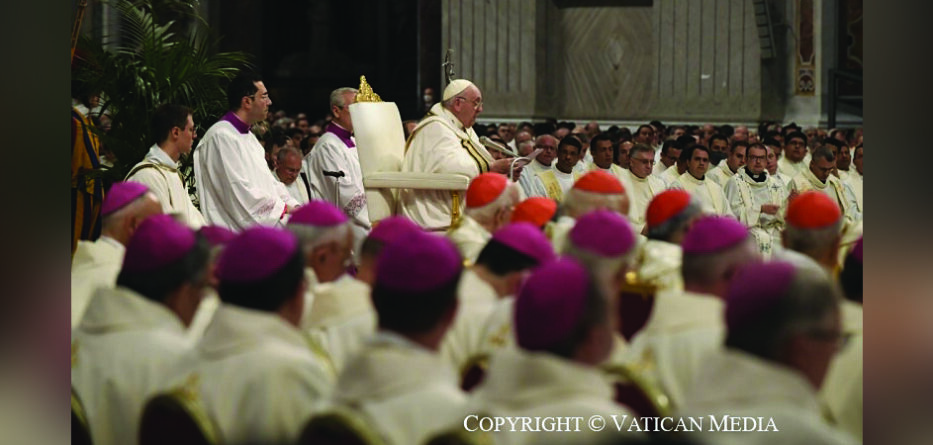Not merely a classification, the synodal bishop is a manifestation of diverse attributes embedded in the synodal process outlined by Pope Francis
The role of a “synodal bishop” within the Roman Catholic Church is a nuanced consideration intertwined with the transformative synodal process that has been initiated by Pope Francis.
Synodality, in essence, refers to assemblies of bishops convened to deliberate on doctrinal, disciplinary, or pastoral challenges facing the Church. But what are the actual characteristics that define a synodal bishop within the context of the evolving Catholic landscape shaped by the Jesuit pope’s visionary approach?
The synodal process unveiled
Francis’ synodal process, though intricate, has sparked significant discourse within the Catholic community. It serves as a platform for positive debate, yet concurrently elicits dissent and division.
Unlike a parliamentary process, the synodal approach encourages collaboration, dialogue, and collective discernment among the Church’s leadership. For some, it represents a school for bishops to learn the art of listening, while others view it as a transformative force challenging the established structures of the Church.
Defining a synodal bishop
A synodal bishop is a classification or a type, not a particular person. This type is the summation of many possible characteristics from which I have chosen nine. Thus, a synodal bishop is not merely a classification but a manifestation of the attributes embedded in the synodal process the pope has outlined.
These attributes, including collegiality, active participation, and collaborative decision-making, extend beyond the episcopal role. They are indicative of the characteristics necessary for the success of the synodal process, applicable to priests, parishioners, teachers, deacons, and religious individuals alike.
1-3: Collegiality, active participation, and collaborative decision-making
The foundation of a synodal bishop’s characteristics lies in the principles of collegiality. Drawing from the Second Vatican Council (1962-65), collegiality underscores shared decision-making and collaboration among bishops, extending to diocesan administration and care for clergy, laity, and religious.
Active participation in synodal gatherings at various levels ensures a synodal bishop’s commitment to fostering dialogue and collective discernment. Collaborative decision-making, involving bishops in the decision-making process alongside the pope, cultivates shared responsibility and ownership among the Church’s leaders.
4-6: Open dialogue, pastoral sensitivity, and liturgical leadership
The synodal bishop further embodies open dialogue, actively listening to diverse perspectives within and outside the Church. This commitment extends to engaging with the contemporary world and the needs of the faithful, guided by the desire for dialogue with the divine.
Pastoral sensitivity, an essential characteristic, involves understanding and responding to the evolving needs of the Church’s members. Liturgical leadership, grounded in the principles of the Second Vatican Council, becomes a crucial aspect of a synodal bishop’s role, transcending mere adherence to liturgical norms.
7-9: Implementing synodal insights, adapting to local realities, and emphasizing inclusivity
Action-oriented characteristics define a synodal bishop’s commitment to implementing insights and decisions arising from synodal gatherings. This involves incorporating recommendations into diocesan plans, fostering ongoing dialogue, and communicating outcomes within the local Church.
Adaptability becomes paramount in navigating the tension between the local and universal Church, tailoring pastoral approaches to specific contexts. Emphasizing inclusivity, a synodal bishop recognizes and values diverse voices within the Church community, ensuring that all contributions are heard and acknowledged.
Conclusion
In the realm of the Catholic Church, the synodal bishop emerges as a pivotal figure aligned with the broader vision of synodality. Actively engaging in the synodal process, the synodal bishop exemplifies dialogue, collegiality, and pastoral sensitivity as essential components in addressing the challenges and opportunities facing the Church in the contemporary world.
As the Church continues to evolve, the synodal bishop stands at the forefront, embodying a collaborative and discerning approach to governance.
J.P. Grayland is currently visiting professor at the University of Tübingen (Germany). A priest of the Diocese of Palmerston North (New Zealand) for nearly thirty years, his latest book is titled: Catholics. Prayer, Belief and Diversity in a Secular Context (Te Hepara Pai, 2020).
Reproduced with permission from La Croix International.
The views expressed in this article are those of the author and do not necessarily reflect the official editorial position of La Croix International.








